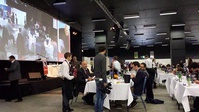|
|
 |
|
May 6, 2014
BRUSSELS — The 20th Concours Mondial de Bruxelles, the world's largest wine competition, has just ended and the takeaway this year, from one judge's perspective, is very encouraging: Global wine quality has never been higher, and there is ample evidence that seriously good wines don't necessarily have to be expensive.
I came to that conclusion after evaluating 151 wines over three days during the Concours Mondial. Although that's a relatively small sampling of the more than 8,000 wines entered this year, my experience mirrored that of a respected colleague who sat on another panel of judges and was blown away by a flight of delicious red blends from Lebanon.
"I thought I was tasting second- and third-growth Bordeaux," said W. Blake Gray, a wine writer whose work appears on numerous influential wine websites. "I gave one of them 100 points. They were from Lebanon. So many of them were simply delicious. I probably gave too many gold medals, but the wines were really good. Lebanon. I couldn't believe it."
 The tasting format at Concours Mondial is for a blind evaluation of each entry submitted. Judges have no information in advance about what type of wine has been presented, where it's from or who produced it. Each wine is part of a "flight" of wines of similar origin and composition. Each wine is identified by a number, which is meaningless to the judges. The tasting format at Concours Mondial is for a blind evaluation of each entry submitted. Judges have no information in advance about what type of wine has been presented, where it's from or who produced it. Each wine is part of a "flight" of wines of similar origin and composition. Each wine is identified by a number, which is meaningless to the judges.
Wines are evaluated and scored on a 100-point scale. Judges are assigned to a tasting panel. Each panel has five judges, and they taste the wines one at a time. Each panel evaluates roughly 50 wines a day. My panel was given five flights each day.
For my panel, the Concours Mondial began with a flight of dry white wines from Italy's Liguria region, many of them made using the vermentino grape. As a group, they were impressive. The wines were fresh and inviting and uniformly well-made. From the seven wines in the flight I awarded three gold medals and three silvers.
Even more surprising was a flight of 12 Bordeaux Superieur from the 2012 vintage. My scorecard had seven gold medals and four silvers. Neither the whites from Liguria nor the Bordeaux from the wrong side of the tracks (as opposed to classified growths of Grand Cru status) could be called expensive.
Day two was more of the same. A flight of 12 dry white wines from Portugal, all produced in the Lisbon region, yielded four gold medals and six silver medals on my card. I can assure you these wines are dirt cheap, although I suspect few if any make their way into the U.S. market. Like the whites from Liguria, the Portuguese whites were clean, crisp and fresh, with no obvious faults.
Later in that day's round the panel was presented a flight of eight wines that turned out to be dry reds from Portugal's Douro region, which is famous worldwide for its fortified sweet Port wines.
The dry reds enjoy no such status and are thus much less expensive. On my scorecard I gave six gold medals. The other two wines just missed the cut for a silver medal.
Alentejo, another top region in Portugal, had a fine showing on the final day. Of the 12 wines in the flight of Alentejo reds, I scored seven of them gold and two silver. Several of the wines were simply stunning.
But that was nothing compared to the showing of 12 primitivos from Puglia, a somewhat obscure region in the south of Italy renowned for its inexpensive red wines. I found all 12 of the wines in the flight to be exceptional. I gave 11 of the 12 gold medals, and the other wine a silver.
Lest you think I'm simply generous, or that I like everything I taste, consider this: From a flight of eight red Burgundies that preceded the primitivos, I gave no gold medals. And from a flight of 10 Champagnes on the opening day of the competition, I also awarded no gold medals.
And that was the lesson of the 20th Concours Mondial: Good wines don't necessarily have to be expensive, and expensive wines don't necessarily have to be good.
Posted by Robert Whitley at 8:20 PM
|
|
 |
|